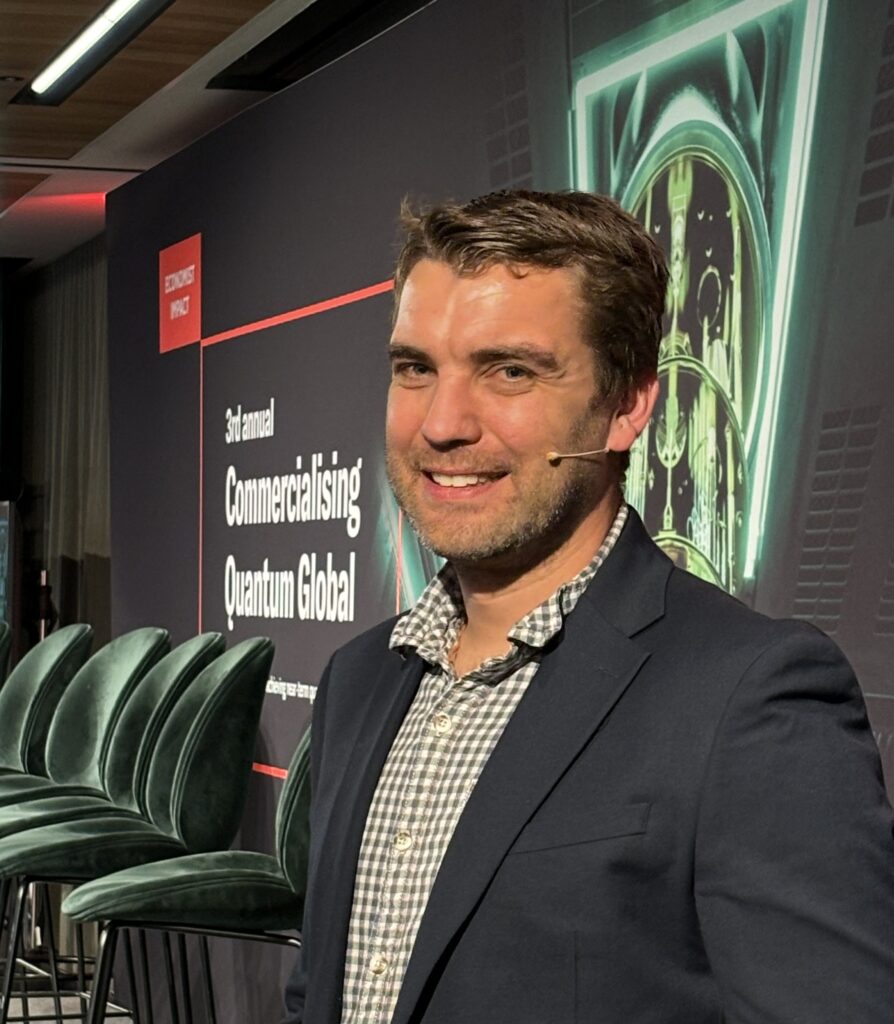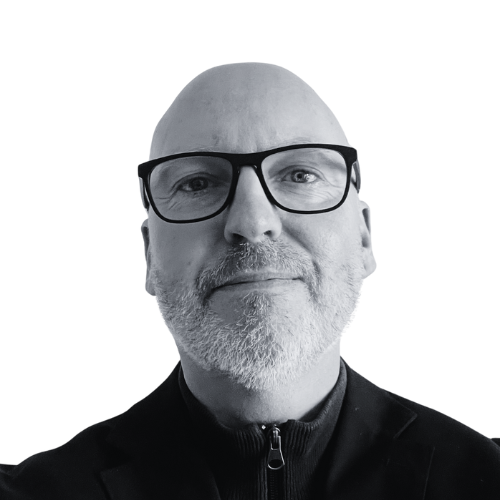Artificial Intelligence
Cyber
Future Telecoms
Materials
Quantum
Wise words and waggishness… February 2026
Reading time: 2 mins
ORCA Computing co-founder on pragmatism, funding, diversity and being humble
There’s a lot to be said for challenging a stereotype. Richard Murray, co-founder and CEO of ORCA Computing is on stage at a recent Economist Impact Commercialising Quantum event in London. He’s a confident, relaxed speaker and has already referred to doing “cool stuff” with photonics. He goes on to speak about new customers, such as the Montana State University (MSU), and the need to “go outside” with quantum – out of the lab and into the real world.
It’s a far cry from the pervasive quantum computing image – a fledgling industry still dominated by theory, and (mainly) men in research labs. The event was a good illustration of where the industry currently sits and there are some promising signs of progress, as we revealed in our recent write-up of the event. As well as the likes of IBM, Google, Nvidia and Microsoft, there are a few start-ups leading the hardware charge (Alice & Bob, Pasqal, QuEra and Atom Computing, for example) and ORCA is certainly among the frontrunners.
“I know what it takes to be successful as a deep tech company. It’s very simple. You have just got to sell things.”
Richard Murray, ORCA Computing
Founded in 2019, ORCA is a University of Oxford spin-out. Murray co-founded the business with Professor Ian Walmsley, provost of Imperial College, London, and honorary fellow at St Hugh’s College, Oxford. In 2020, ORCA secured £2.9 million pre-seed investment led by Atmos Ventures, while two years later, a Series A round led by Octopus Ventures saw the company secure $15m. ORCA has also been the recipient of numerous Innovate UK grants, including £11.6m in 2021 for the Quantum Data Centre of the Future project, with KETS Quantum Security and University of Bristol’s Smart Internet Lab, among others.
“I love science,” says Murray, speaking to Bristol Innovation Foresight in the busy networking and exhibition space of the Commercialising Quantum event. “I’m not really an academic. In fact, I’ve rubbed some academics up the wrong way. I have no interest in the fundamental origins of the universe but I love the application of physics, seeing it being used in products that people need.”
Murray is clearly business-driven. While he recognises the value of innovation, he is also pragmatic in his approach to ORCA’s priorities, something influenced by his three years spent setting up and running Innovate UK’s £32m innovation programme for quantum. He has form and an understanding of how funding works, and exactly what it takes to justify investment in innovative technologies.
“I see a lot of companies really striving for massive scale, perfect quantum computers,” says Murray. “My technical guys would love us to do that but I believe that if you leave it until then, it’s too late. Technology has inertia to it, so just being much more immediate with how we do things is good for the business.”

ORCA has already completed a number of commercial deals, with the recent MSU purchase of two ORCA PT-1 quantum photonics systems the latest in an order book that includes the Poznań Supercomputing and Networking Center (PSNC) in Poland, Digital Catapult’s Quantum Technology Access Programme and the UK’s Ministry of Defence. Murray hints at five more installation deals in the pipeline this year.
“At the end of the day, we are a commercial organisation,” says Murray. “I mean, we also see other companies who are not really commercial enough and lots of companies formed from just academics, and still carrying on as a research activity. As a start-up, you have got to make sure that at the end of it, you’ve got something strong enough to compete. I feel like I know what it takes to be successful as a deep tech company. It’s very simple. You have just got to sell things.”
Murray regularly uses the word “stuffy” to describe the more traditional side of university spin-outs, or elements of the industry he feels need an injection of dynamism. He talks about Google and IBM, how the big tech companies will have a big role in quantum and how that “excites” him.
“I don’t believe it makes any sense to go head-on against Google or Nvidia,” he says. “It’s a game you’re going to lose – but I don’t believe it’s possible even for a Google to have a complete monopoly on all good ideas.”
Murray points to all the start-ups in the room, highlighting the different flavours of quantum and how they all have a slightly different focus. He says it’s important to build the industry out, with so many companies vying for a slice of the market. However, he is also aware of the industry’s lack of gender diversity, recognising a need for positive intervention.
“You have to be a well-rounded person to be an entrepreneur”
Richard Murray, ORCA Computing
With two physics teachers for parents, Murray had his own science role models growing up. He fondly remembers his dad taking him to a British Association for Young Scientists Day at the age of 10. Understanding the value of role models is important when it comes to taking on diversity challenges.
ORCA teamed-up with the Institute of Physics last year to hold a hackathon for A Level students, 50% of which were young women, with all participants coming from mixed backgrounds. They were taught to download and use Python, getting ORCA’s technical people to “geek out with them and program stuff.”
Murray talks about the need for more women role models and addressing the root causes in education, investigating just why so many young women fall away from the sciences. He says some university environments can be “pretty stuffy” and unappealing.
“I’m on the board of several centres of doctoral training (CDTs),” says Murray, “and I am trying to push them to be less stuffy, more dynamic and open to different viewpoints from young and more diverse people. It’s got to change.”
Much of this change will come from focusing on where quantum can have a big impact, such as in reducing energy and water consumption in data centres. Sustainability can be a key driver of quantum, and is illustrative of what Murray sees is a need for cross-discipline skills. His advice to anyone thinking of starting a company based on innovative research is to occasionally step away and take a broader view.

“You have to be a well-rounded person to be an entrepreneur,” says Murray, adding that he’s still learning. “Obviously, there are many people who fall into the technical track of just being a technologist and an expert, but to be an entrepreneur, you have to be more adaptable. And that requires being much more alert. Much more aware of the world outside the lab.”
Murray also talks about being humble. Recognising your limitations, asking questions and accepting that you may never be the smartest person in the room. For someone who wanted to be an engineer – at least until he was inspired by George Gamow’s Mr Tompkins books in his gap year, which turned his head towards physics – he seems to be doing pretty well in a technically challenging space. His last bit of advice is to listen, especially to customers, adding that his role is then essentially turning innovation into a business opportunity.
“There’s this whole balance between what we know, in terms of the technology and what the customer knows and needs,” says Murray. “You have to sort of marry the two together, which is almost what innovation is all about. You can’t just bow down to whatever customers want, because they might want something that you’re not in a position to deliver. So, there’s this sort of funny dance and then you come up with something that works. That’s what it’s really all about.”

Working as a technology journalist and writer since 1989, Marc has written for a wide range of titles on technology, business, education, politics and sustainability, with work appearing in The Guardian, The Register, New Statesman, Computer Weekly and many more.
Quantum
Reading time: 10 mins
Quantum
Reading time: 10 mins
Future Telecoms
Reading time: 2 mins
Quantum
Reading time: 11 mins
Quantum
Reading time: 5 mins